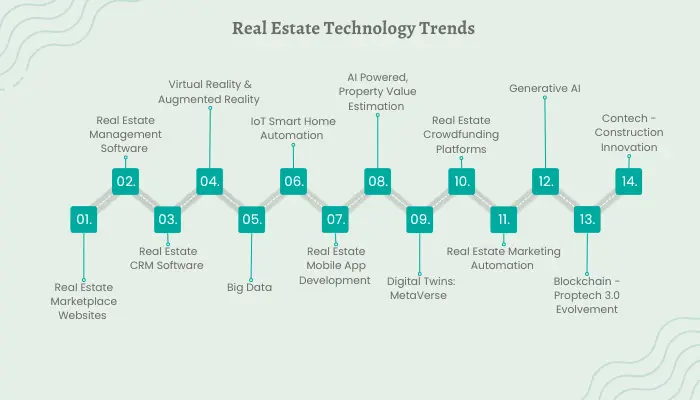In this blog, we are going to discuss real estate technology trends.
Real estate on its own is one of the world’s largest industries. After all, cities are growing at an amazing rate as the urban population is projected to reach 9.3 billion by 2050.
Now, if real estate firms and agents plan to grow and dominate in the industry, they have to adapt to the market of the future.
Well, we shall be discussing all you need to know about real estate technology trends in this blog. So with this being said, let’s get right into it:
PropTech, Next Step For Real Estate Market

If you are interested in real estate technology trends, you must have already heard of real estate app development.
But let us assure you, there’s much more to the real estate tech aspect than this.
PropTech.
It is a powerful fusion of technology and real estate, and presents a game-changing opportunity for forward-thinking firms and agents.
Imagine optimizing every aspect of your real estate operations through innovative digital solutions. Now, proptech works like an umbrella term that branches off into various different things.
This covers everything from real estate virtual tours to IDX real estate websites.
Moreover, PropTech champions sustainability.
Your business operations can integrate smart technologies and green designs, aligning your business with eco-conscious trends while reducing operational costs.
Investing in PropTech-focused development services positions you as an industry pioneer, transforming how you engage clients, close deals, and innovate in the digital age.
Moving on, it’s time to get into the real estate technology trends in the section below.
Real Estate Technology Trends

Trends drive industries. That’s why smart businesses recognize these trends and use them to elevate themselves.
Well, if you are someone who wants to do just that, we will be taking you through real estate technology trends.
Therefore, with this being said, let’s get right into it:
1. Real Estate Marketplace Websites
The very first trend has to be real estate marketplace websites.
In today’s digital age, real estate marketplace websites have redefined how properties are bought and sold.
These platforms gather listings from various sources, presenting you with a comprehensive array of options.
You can filter properties based on your preferences, such as location, price range, and features.
In addition, these platforms also allow you to communicate directly with sellers, agents, and even fellow buyers, streamlining the entire buying or selling process.
One of the big examples of the same is an app like Offerup. It isn’t exactly a website, but you get the gist of it.
2. Real Estate Management Software
Imagine having a centralized hub to oversee your entire real estate portfolio.
Real estate management software empowers you to track rent payments, maintenance requests, and lease expirations seamlessly.
You can communicate with tenants and property managers, ensuring that your properties are well-maintained and revenue streams are optimized.
These platforms often come with financial reporting features, giving you insights into your investment’s performance.
As you can see, this is a PropTech Solution that a lot of Agencies and Firms can use, making it one of the top real estate technology trends.
3. Real Estate CRM Software
This is a big one.
Building and maintaining relationships is crucial in the real estate industry.
Real estate CRM software assists you in managing your interactions with clients, leads, and partners.
You can organize contact information, track communication history, and schedule follow-up tasks. This technology ensures that no opportunity is missed and that your network remains strong and engaged.
Now there are two things you can get here, either go for one of the best real estate CRM software. Or you can build your own custom CRM with the help of a real estate solution development company.
4. Virtual Reality & Augmented Reality
Let’s first clarify something, AR/VR and Metaverse though related are two different things, as we will learn later in the blog.
As of now, let’s see how this real estate technology trend works.
Augmented Reality (AR) overlays digital information onto the physical world, while Virtual Reality (VR) immerses you in a completely digital environment.
In real estate, AR can help visualize interior design changes or potential renovations in real-time.
VR, on the other hand, enables virtual property tours, making it easier for you to assess properties remotely, saving time and resources.
As of today, real estate is one of the top properties using virtual reality apps.
5. Big Data
Big Data is one of the biggest trends not only in PropTech but entire Industry 4.0.
But focusing on the specifics, the real estate market generates vast amounts of data, which, when analyzed, can yield invaluable insights.
Big data analytics can help you understand market trends, predict property value fluctuations, and identify investment opportunities.
By analyzing historical and current data, you can make informed decisions that align with your investment goals.
6. IoT Smart Home Automation
The Internet of Things (IoT) has extended its reach to real estate through smart home automation.
IoT devices like smart thermostats, security cameras, and connected appliances allow you to control and monitor your properties remotely.
Moreover, you can adjust settings, receive alerts, and even automate routine tasks, enhancing the efficiency and value of your real estate investments.
7. Real Estate Mobile App Development
If you are someone in the real estate business, you must have at least once thought to hire an app developer and create an app for your business.
And rightfully so!
Mobile apps designed for real estate empower you with information and tools at your fingertips.
These apps provide access to property listings, allowing you to browse and filter options on your smartphone or tablet.
You can also receive notifications about new listings, price changes, and market trends. Real estate apps keep you connected to the market wherever you are.
8. AI Powered, Property Value Estimation
AI, AI, AI!
Artificial intelligence is the name of the game of our century. And even more so in recent times with solutions like ChatGPT and overall generative AI growing common. ( we will discuss that in detail later down the line.)
In any case, Artificial Intelligence, fueled by vast amounts of data, can accurately estimate property values.
These AI algorithms consider factors like property size, location, recent sales, and local market trends.
This technology aids you in setting competitive listing prices, negotiating purchases, and assessing investment potential. And this makes it one of the best real estate technology trends.
9. Digital Twins: MetaVerse
Metaverse is yet another megatrend that has affected almost every other industry.
And here’s how it affects real estate.
Have you ever heard of buying property in the metaverse? Well, if you have, the official name for that is Digital Twins.
Digital twins are virtual replicas of physical properties.
Using data from sensors and other sources, digital twins simulate real-world scenarios.
This technology is particularly useful for property management, as it allows you to predict maintenance needs, simulate energy efficiency improvements, and address potential issues before they arise.
Now, if you are hell-bent on making this your own thing, you can develop a virtual world using an unreal engine.
10. Real Estate Crowdfunding Platforms
Crowdfunding has democratized real estate investment. And become one of the best real estate technology trends today.
Moreover, these platforms pool funds from multiple investors to finance real estate projects.
You can invest with smaller amounts of capital, diversifying your investment portfolio without the need for substantial upfront costs.
Real estate crowdfunding provides access to a wider range of properties and projects.
11. Real Estate Marketing Automation
It goes without saying that, marketing is a big thing, especially in sales focused industries like real estate.
And with the help of one of the real state technology trends, it can be made much easier. Let us explain:
Marketing automation tools streamline your communication efforts.
You can create and schedule email campaigns, social media posts, and advertisements to target specific audiences.
These tools save you time and ensure consistent communication with potential buyers, sellers, and partners.
12. Generative AI
Yeah, we know, we already mentioned AI once before, but trust us, this is different.
Generative AI algorithms use predefined parameters to create designs.
In real estate, this technology can assist in architectural design, layout planning, and interior design.
Moreover, it accelerates the creative process and enables you to visualize various design possibilities quickly.
13. Blockchain – Proptech 3.0 Evolvement
Blockchain is one of the few trends that rival the popularity of AI.
Beyond transactions, blockchain can facilitate fractional ownership and streamline property management.
Proptech 3.0 envisions an evolved real estate ecosystem where blockchain technology connects diverse real estate assets, creating a seamless and transparent network.
This is one of those real estate technology trends to look out for.
14. Contech – Construction Innovation
Last but still one of the greatest real estate technology trends out there is,Contech.
Construction technology (Contech) is driving innovation in property development. 3D printing, modular construction, and advanced materials are changing how properties are built.
Moreover, these technologies enhance efficiency, sustainability, and cost-effectiveness, ultimately shaping the future of real estate construction.
Conclusion
These are the real estate technology trends that you ask a real estate agent or firms should look out for. And with this being said, it’s time to conclude the blog. If you are someone who wants to invest in these platforms, you should consider consulting a real estate solution provider.
FAQ
Trends include AI-driven property valuation, virtual property tours, blockchain-based transactions, and smart home integrations, enhancing efficiency and customer experience.
AI is streamlining property searches, predicting market trends, and automating customer interactions, allowing agents to focus on personalized services and strategic decision-making.
Blockchain ensures transparent, secure property transactions, reducing fraud risk, minimizing intermediaries, and accelerating the closing process.
Yes, virtual tours using VR/AR technology are increasingly popular, enabling buyers to explore properties remotely and make more informed decisions.
Smart home features, such as IoT-connected devices and energy-efficient systems, are becoming more desirable, influencing property values and buyer preferences.
Data analytics aids in predicting market trends, pricing properties accurately, and targeting potential buyers with tailored marketing strategies.
While urban areas still attract demand, there’s a noticeable shift toward suburban properties due to remote work trends and the desire for more space and affordability.
Remote work has led to increased demand for home offices, flexible living spaces, and properties in areas that offer a better work-life balance.
Agents are upskilling in tech, embracing virtual tools, and focusing on personalized services to navigate the changing landscape and meet client expectations.

Niketan Sharma is the CTO of Nimble AppGenie, a prominent website and mobile app development company in the USA that is delivering excellence with a commitment to boosting business growth & maximizing customer satisfaction. He is a highly motivated individual who helps SMEs and startups grow in this dynamic market with the latest technology and innovation.
Table of Contents












No Comments
Comments are closed.